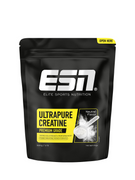So erkennst du einen Vitaminmangel & verhinderst ihn
Eine ausgewogene Ernährung mit Obst und Gemüse gehört zu einem gesunden und fitten Lifestyle. Denn diese Lebensmittel enthalten besonders viele Vitamine, die nahezu bei jedem lebensnotwendigen Prozess im Körper beteiligt sind. Obwohl wir uns gesünder ernähren, kann es unter Umständen in jedem Lebensalter zu einem Vitaminmangel kommen. Die Ursachen und auch die Folgen eines Vitaminmangels können sehr unterschiedlich sein. Daher ist es wichtig, einen Mangel an Vitaminen schnell zu erkennen und auszugleichen.
In unserem Ratgeber erklären wir, wie ein Vitaminmangel entstehen kann, welche Ursachen und Symptome möglich sind und wie du einem Mangel bereits vorbeugen kannst.
Wann liegt ein Vitaminmangel vor?
Von einem Vitaminmangel wird gesprochen, wenn der Körper nicht ausreichend mit einem oder mehreren Vitaminen versorgt wird. Dadurch entsteht ein Mangel, welcher sich durch bestimmte Symptome oder das Unterschreiten von Grenzwerten z. B. im Blut nachweisen lässt.
Vitamine sind organische Verbindungen und gehören zu den Mikronährstoffen. Das sind lebenswichtige essenzielle Nährstoffe, die dein Körper nicht selbst herstellen kann und daher über die Nahrung aufnehmen muss. Eine Ausnahme bildet hier das Vitamin D, welches größtenteils über die Haut aufgenommen wird. Bei Menschen sind aktuell 13 Vitamine bekannt, die der Körper benötigt. Als essenzielle Nährstoffe sind Vitamine an vielen Abläufen im Körper beteiligt, beispielsweise am Stoffwechsel von Eiweißen, Kohlenhydraten und Fetten und am Aufbau von Enzymen, Hormonen und Blutzellen. Auch das Immunsystem wird beeinflusst. Vitamine lassen sich in wasserlösliche und fettlösliche Gruppen unterteilen. Fettlösliche Vitamine kann der Körper einspeichern, z. B. in der Leber, daher müssen sie nicht zwingend täglich aufgenommen werden. Wasserlösliche Vitamine hingegen können kaum oder gar nicht gespeichert werden und müssen dem Körper täglich über die Nahrung zugeführt werden.
Um Mangelerscheinungen aufgrund fehlender Vitamine vorzubeugen, existieren die D-A-CH-Referenzwerte für verschiedene Personengruppen, welche die Menge an Vitaminen aufzeigen, die täglich zugeführt werden sollten. Eine Unterschreitung dieser Referenzwerte bedeutet allerdings nicht automatisch, dass du unter Vitaminmangel (Hypovitaminose) leidest. In erster Linie bedeutet es, dass die Wahrscheinlichkeit größer ist, dass du deine empfohlene Zufuhr an Vitaminen nicht deckst.[¹]
Was ist der häufigste Vitaminmangel?
In Deutschland erreichen Personen vor allem bei Vitamin D und Folsäure nicht die empfohlene tägliche Menge. Viele Menschen nehmen auch zu wenig Vitamin E und Vitamin B12 sowie die Spurenelemente Eisen, Calcium und Jod auf. Bei diesen Vitaminen kann es also häufiger zu einem Vitaminmangel kommen.
Zu diesem Ergebnis kommt die „Nationale Verzehrsstudie II“ des Max-Rubner-Bundesforschungsinstituts und des Bundesministeriums für Ernährung, Landwirtschaft und Verbraucherschutz. In der Untersuchung wurde die Ernährung von fast 20.000 deutschsprachigen Menschen betrachtet.[²] Innerhalb der Studie wird auch deutlich, dass sich die Unterversorgung von Vitaminen bei Frauen und Männern unterscheidet. Die stärker zu beachtenden Vitamine für Frauen und die Vitamine für Männer sind daher unterschiedlich. Gerade für Frauen sind bestimmte Vitamine und Mineralstoffe wie Eisen und Folsäure sehr wichtig. Generell ist eine Hypovitaminose, also der Mangel an Vitaminen, in westlichen Ländern bei gesunden Personen mit einer ausgewogenen Ernährung selten. Die Studie zeigt jedoch, dass bestimmte Vitamine zu wenig aufgenommen werden. Unter bestimmten Umständen kann es dann zu einem Vitaminmangel kommen.
Vitaminmangel – das sind die Ursachen
Zu einem Vitaminmangel kommt es, wenn der Bedarf an Vitaminen längerfristig nicht gedeckt wird. Die Ursachen für einen Vitaminmangel können dabei sehr unterschiedlich sein. Ein Grund kann eine falsche Ernährung sein. Doch auch wenn du dich gesund und ausgewogen ernährst, kann ein Mangel an Vitaminen beispielsweise durch eine Erkrankung auftreten.
Die häufigsten Ursachen für einen Vitaminmangel sind folgende:
Falsche Ernährung
Eine falsche beziehungsweise einseitige Ernährung kann dazu führen, dass du den Vitaminbedarf deines Körpers nicht ausreichend deckst. Durch das umfangreiche Angebot an Nahrung kommt es in den westlichen Ländern eher selten zu Mangelerscheinungen aufgrund fehlender Vitamine. Doch durch bestimmte langfristige Diäten, übermäßigen Konsum von Fast Food oder Essstörungen kann auch hier ein Vitaminmangel festgestellt werden.
Ein erhöhter Alkoholkonsum kann ebenfalls eine Ursache für Vitaminmangel sein. Denn Alkohol kann zu einer Störung der Leber führen, wodurch bestimmte Vitamine nicht mehr richtig verstoffwechselt werden können.
Vegane Ernährung
Bei der veganen Ernährung verzichtest du bewusst auf tierische Lebensmittel wie Fleisch, Fisch oder Milch. Durch den Verzicht dieser Gruppe von Lebensmitteln kann es sein, dass die Zufuhr einiger Vitamine und anderer Nährstoffe über die Nahrung nicht ausreichend gegeben ist. Besonders bei Vitamin B12 kann es zu einem Mangel kommen. Denn dieses Vitamin befindet fast ausschließlich in tierischen Lebensmitteln. Gleiches gilt demnach für Vegetarier. Beide Gruppen müssen sich aber nicht zwingend Sorgen um einen Vitaminmangel machen, denn es gibt speziell entwickelte Nahrungsergänzungsmittel, die gezielt einem Mangel vorbeugen können. Innovative Sprays sorgen außerdem für eine optimale Aufnahme von Vitamin B12 über die Mundschleimhaut.
Erkrankungen
Verschiedene Krankheiten wie Diabetes und Krebs, Störungen und Beschwerden an der Leber oder den Nieren oder bestimmten Unverträglichkeiten können ebenfalls zu einem Mangel an Vitaminen führen. Gründe für einen Mangel bei diesen Krankheiten können diverse Störungen sein, durch welche die Vitamine nicht mehr richtig verstoffwechselt werden. Häufig entsteht eine Unterversorgung auch durch die Therapien zur Behandlung von Krankheiten wie etwa Dialyse oder bestimmte Medikamente.
Erkrankungen im Bereich des Darms können ebenfalls die Vitaminversorgung beinträchtigen. Viele Vitamine werden im Darm vom Körper aufgenommen. Ist dieser Prozess gestört, kann ein Vitaminmangel folgen.
Erhöhter Vitaminbedarf
In einigen Lebensphasen oder unter bestimmten Lebensumständen ist der Bedarf an Vitaminen höher. Wird in diesen Phasen nicht auch die Zufuhr der benötigten Vitamine angepasst, kann es zu einer Unterversorgung und dadurch zu einem Vitaminmangel kommen. Lebensphasen, in denen der Vitaminbedarf erhöht ist, sind z. B. Wachstumsphasen von Kindern und Jugendlichen oder die Schwangerschaft und Stillzeit. Auch bei älteren Menschen mit einem reduzierten Grundumsatz und wenig körperlicher Bewegung kann der Bedarf erhöht sein. Unter bestimmten Lebensumständen wie anhaltendem körperlichen oder emotionalen Stress, Rauchen oder bei intensivem Sport ist der Bedarf an Vitaminen ebenfalls oft höher und muss dementsprechend zusätzlich gedeckt werden.
Lichtmangel bei Vitamin D
Da Vitamin D zum Großteil über die Haut und nicht durch die Ernährung aufgenommen wird, kann die Ursache bei einem Vitaminmangel auch eine andere sein – und zwar der Mangel an Licht bzw. Sonne. Nimmt die Haut UV-B-Strahlen auf, wird das Provitamin D3 – eine Substanz, die in den menschlichen Hautzellen vorhanden ist – in das Prävitamin D3 umgewandelt, sodass über weitere Stoffwechselprozesse letztlich Vitamin D vom Körper gebildet wird. Gerade im Winter, wenn man sich selten draußen aufhält, kann es häufiger zu einem Vitamin D-Mangel kommen. Der Anteil, der über die Nahrung aufgenommen wird, ist ebenfalls nicht immer ausreichend, um den Bedarf zu decken. Nur in wenigen, vorrangig tierischen Lebensmitteln, ist Vitamin D zu finden. Durch seine unterstützenden Funktionen, z. B. beim Erhalt der Knochen, ist es – genau wie das Vitamin K – für den Körper jedoch unverzichtbar. Häufig werden daher bei diesen Vitaminen Nahrungsergänzungsmittel zur Unterstützung eigesetzt, um einem Mangel vorbeugen. Spezielle Pumpsprays für die orale Aufnahme vereinfachen die Zufuhr von Vitamin D und K.
Welche Symptome treten bei Vitaminmangel auf?
 Bei einem Mangel an Vitaminen können sehr unterschiedliche Symptome auftreten, welche nicht gleich auf einen Vitaminmangel hindeuten. Welche Symptome bei Vitaminmangel erkennbar sind, hängt vor allem von dem Vitamin ab, welches nicht ausreichend vorhanden ist. Typische Anzeichen von Vitaminmangel können z. B. folgende sein:
Bei einem Mangel an Vitaminen können sehr unterschiedliche Symptome auftreten, welche nicht gleich auf einen Vitaminmangel hindeuten. Welche Symptome bei Vitaminmangel erkennbar sind, hängt vor allem von dem Vitamin ab, welches nicht ausreichend vorhanden ist. Typische Anzeichen von Vitaminmangel können z. B. folgende sein:
- Müdigkeit
- Konzentrationsschwäche
- Depressive Verstimmungen
- Geschwächtes Immunsystem
- Blutarmut
Die Anzeichen für einen Vitaminmangel sind besonders im Anfangsstadium der Hypovitaminose schwer zu erkennen, da die Symptome sehr unspezifisch sind und viele Ursachen haben können. Dennoch ist es wichtig, einen Vitaminmangel früh zu erkennen und zu beheben, denn je nach Dauer und Ausmaß der Unterversorgung kann es zu schweren Folgen kommen.
Wir zeigen dir, anhand welcher Symptome du einen Vitaminmangel erkennen kannst und mit welchem Vitamin dein Körper in diesem Fall unterversorgt sein kann.
- Müdigkeit und Erschöpfung
An manchen Tagen fühlt man sich einfach nicht fit und ist müde. Doch treten Müdigkeit und Konzentrationsschwäche häufiger oder über einen längeren Zeitraum auf, kann das ein Anzeichen für einen Vitaminmangel sein.[³] Bei diesen Symptomen kann vor allem ein Mangel an B-Vitaminen wie Vitamin B1, B5 oder B12 oder Vitamin E vorliegen.
- Probleme mit Haut und Haaren
Wird die Haut sehr empfindlich und gereizt, kann ein Mangel an Vitamin C[⁴] oder Vitamin A die Ursache sein. Auch bei Haarausfall kann eine Unterversorgung der B-Vitamine vorliegen, aber auch ein Vitamin D-Mangel kann diese Symptome hervorrufen.[⁵]
- Schwaches Immunsystem
Du bist besonders anfällig für Erkrankungen? Dann kann das an einem geschwächten Immunsystem liegen. Auch das kann ein Symptom für einen Vitaminmangel sein. [⁶] Damit dein Immunsystem gestärkt ist, muss der Körper mit allen Vitaminen ausreichend versorgt sein. Wichtig für die Gesundheit bzw. ein gestärktes Immunsystem sind vor allem die Vitamine A, B, C, D und E.
- Entzündungen und Gelenkschmerzen
Bei einem fortgeschrittenen Vitaminmangel können auch Symptome wie Beschwerden und Entzündungen an verschiedenen Stellen des Körpers auftreten. Auch diese lassen häufig nicht sofort auf einen Mangel verschiedener Vitamine schließen. Verantwortlich für die Symptome kann beispielsweise der Mangel an Vitamin D sein.[⁷]
So kannst du einem Vitaminmangel vorbeugen

Damit es gar nicht erst zu Symptomen eines Vitaminmangels kommt, kannst du einem Mangel auch vorbeugen. Das wichtigste dabei ist eine ausgewogene und gesunde Ernährung mit viel Obst und Gemüse. Dadurch ist dein Vitaminbedarf bereits umfangreich gedeckt. Selbst wenn du an einem Tag nicht den vollen Tagesbedarf erreichst, verfügt dein Körper bei einer ausgewogenen Ernährung über genügend Reserven.
Um alle essenziellen Vitamine aufzunehmen, sollte deine Ernährung vor allem vitaminreiche Lebensmittel wie Obst und Gemüse enthalten, aber auch Vollkornprodukte, Nüsse und Getreide. Auch Fisch, Fleisch und tierische Produkte liefern Vitamine und andere wichtige Nährstoffe und können in Maßen in deine Ernährung integriert werden. Lebst du vegetarisch oder vegan, kann deine Ernährung auch ohne tierische Lebensmittel ausgewogen sein. Du solltest nur bestimmte Vitamine wie B12 genauer im Auge behalten und gegebenenfalls supplementieren. Durch eine schonende Zubereitungsart von Gemüse kannst du noch mehr Vitamine erhalten. Anstatt das Gemüse zu kochen, kannst du es dünsten, garen oder grillen. Um einen Vitaminmangel durch Nikotin und Alkohol zu verhindern, sollte der Konsum in Maßen gehalten werden.
Möchtest du deinen Körper zusätzlich mit Vitaminen unterstützen, wenn du deinen täglichen Bedarf durch die Nahrung nicht decken kannst? Nahrungsergänzungsmittel können dir dabei helfen, einem Vitaminmangel vorzubeugen. Mit dem ESN B12 MHA-Komplex Spray kannst du die Zufuhr von Vitamin B12 einfach unterstützen. Vitamin B12 hält dich fit, denn es trägt zu einem normalen Energiestoffwechsel und zur Verringerung von Müdigkeit und Erschöpfung bei. Besonders bei veganer oder vegetarischer Ernährung ist das Pumpspray z. B. mit Limettengeschmack eine sinnvolle Ergänzung. Im Winter fehlt vielen Menschen vor allem Vitamin D – hier kannst du mit dem ESN D3+K2 Spray einen Mangel verhindern. Das Pumpspray, z. B. in der Geschmacksrichtung Kirsche, enthält die Vitamine D und K, die zum Erhalt normaler Knochen beitragen. Vitamin D trägt zusätzlich zum Erhalt einer normalen Muskel- und Immunsystemfunktion bei. Solltest du generell Schwierigkeiten mit einer gesunden und ausgewogenen Ernährung haben, kannst du mit unseren Vitamin Kapseln nachhelfen.
Tipps zum Vermeiden von Vitaminmangel
- Gesundes und ausgewogenes Essen
- Viele vitaminreiche Lebensmittel – besonders Gemüse
- Vollkornprodukte anstatt Weißmehl
- Fleisch und tierische Fette nur in Maßen
- Wenig Fast Food, Nikotin und Alkohol
- Schonende Zubereitung des Essens
- Kurze Lagerzeit von frischem Gemüse, um die Vitamine zu erhalten
- Viel Bewegung im Freien, um den Vitamin D-Bedarf zu decken
- Verzicht auf Radikaldiäten
Mangel an Vitaminen wieder ausgleichen
Entdeckst du Symptome eines Vitaminmangels, kann es sinnvoll sein, diese bei einem Arzt abklären zu lassen. Mithilfe eines Bluttests kann dieser herausfinden, ob und welcher Mangel vorliegt. Stellt der Arzt einen Vitaminmangel fest, lässt er sich in der Regel einfach durch die gezielte Einnahme der fehlenden Vitamine beheben. Auch bei einem bestätigten Mangel helfen die Tipps zum Vermeiden eines Vitaminmangels, um diesen wieder auszugleichen. Je nach Ausmaß des Vitaminmangels kann auch das Supplementieren von Vitaminen helfen, den Bedarf wieder zu decken.
Wenn du vor allem auf eine gesunde und ausgewogene Ernährung achtest, lässt sich ein Vitaminmangel in den meisten Fällen einfach verhindern. Ist deine Ernährung z. B. aufgrund deiner Lebensweise nicht ganz so ausgewogen, musst du dir keine Sorgen machen. Du kannst im Vorfeld schon notwendige Vitamine supplementieren und so einem Mangel vorbeugen.
Quellen:
[1] https://www.dge.de/presse/pm/deutschland-ist-kein-vitaminmangelland/
[3] https://pubmed.ncbi.nlm.nih.gov/31963141/
[4] https://pubmed.ncbi.nlm.nih.gov/28805671/
[5] https://pubmed.ncbi.nlm.nih.gov/30547302/








